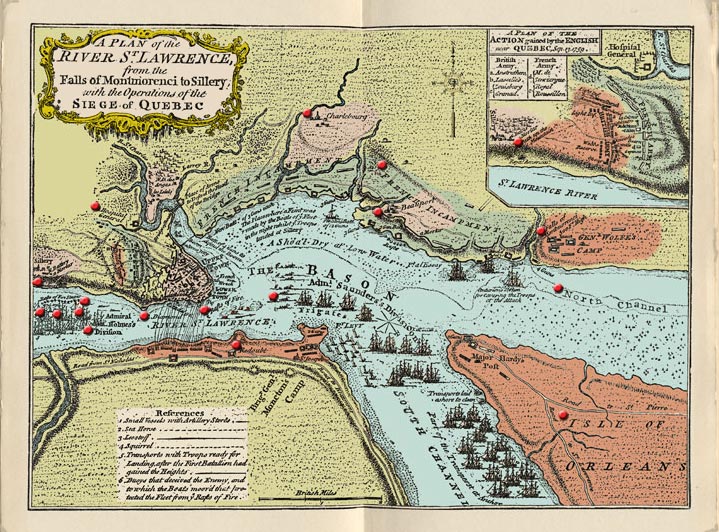Barbe Vermet.
Her husband's death left Barbe her two boys, our three year old ancestor Pierre and his two year old brother Joseph, but she could rely on her large family to provide support to her and the children for a time.
On 10 July 1754 Barbe married the widower Pierre Hilarest in Saint-Augustin-de-Desmaures. He was a casseur, working in a quarry. Hilarest's first wife Louise Morin had died in February. He did not have any children but in the marriage contract Hilarest agrees to raise Barbe's two young boys, now aged six and five, as his own. Barbe was 42 at the birth of another son, also named Pierre, born a year after the wedding on 4 July 1755 in Saint-Augustin-de-Desmaures. A hopeful start, but for the fact their marriage occurred on the cusp of the French and Indian War.
La guerre de la Conquête.
The French and the British were longtime adversaries, each coveting the colonies of the other in the New World and the riches they would bring. Hostilities commenced yet again in May 1754 when a colonial major, George Washington, ambushed a party of French soldiers led by Joseph Coulon de Villiers de Jumonville. The New World war eventually spilled over to the Old in what became known as the Seven Year's War. Even with the support of the Wabanaki Confederacy, the Algonquin, the Ojibwa and the Ottawa the French forces were outnumbered 4 to 1 from the beginning. The British were allied with the Iroquois, and more importantly, their colonies were more heavily populated.
It was a brutal conflict that in the beginning seemed to favor the French. In November 1757 300 French and Indians descended on the Mohawk Valley under the command of General de Belletree. Though the settlers had been warned they did not heed the news, and the prosperous German Flatts settlement was burned to the ground while their own soldiers held fast in the fort. In the mayhem, some were able to escape to the relative safety of Fort Herkimer. The French and their allies killed 40, and took 150 Palatines hostage. The prisoners and looted goods were brought back to Canada.
Twice Widowed.
In another cruel turn of events, Barbe lost her second husband. Some sources claim he died in Pérade in March 1757. But these were dangerous times and Barbe would need to remarry to provide security for her young family.
Henry Grace was born in London about 1712 and came to Halifax at the age of eight. To marry Barbe, he swore he renounced Protestantism and embraced her Catholic faith. This was attested to by M. Lamar of the hôpital. The couple wed on 3 July 1758 in Ville de Québec.
The Fall of Québec.
The British had tried to take the city in an unsuccessful attempt in 1690. This siege was to last for three months as the British swore that "if we can't beat them, we shall destroy their country". Toward that end over 15,000 bombs were flung at the capital city by some estimates. Neighboring villages and farms were burned to the ground and the inhabitants were imprisoned and in some cases returned to France. The British won a decisive victory on the Plains of Abraham, the landward approach to the city, on 13 September 1759.

.
The British and the remaining settlers were to face a severe winter in the ruins of the city. There was little food left after the devastating assault on area farms. The following year the French launched an attempt to liberate the town but in the end it was to no avail. The die had been cast and Montréal fell in September of 1760. To paraphrase the words of Eugène-Étienne Taché, those born under the French lily or fleur-de-lys, would grow under the rule of the British Tudor Rose.
Barbe's next move was to leave the shattered area, though the date she left with her three boys is unclear. No further mention is made of M. Grace. Other ancestors, such as the Bulteaus, seem to have departed around the same time.
Her parents remained. Jeanne-Angelique Dupil and Jacques Vermet died in Saint-Augustin-de-Desmaures in 1761 and 1774 respectively.
The next record which pertains to the family is found in Montréal for the marriage of Barbe's son Joseph to Elizabeth Lenoir on 22 May 1777. She was the widow of Philippe Vêtu. In their marriage contract there is a provision to provide 50 ecus annually to his mother, Barbe. They had at least one daughter, and it appears Joseph left (without Elizabeth) for Baltimore, Maryland where he died some years later. Barbe lived in Montréal until her death on 31 July 1790 at age 77.
- Plan of Quebec, 1759. From a map published in London in 1760, face page 268 of Old Quebec, The Fortress of New France by Gilbert Parker and Claude G. Bryan, 1904, scanned image, color added
- Daniel Marston, Essential Histories, The French-Indian War 1754-1760, Osprey Publishing, 2002, p59
- Library and Archives Canada online MIKAN no. 2895520
